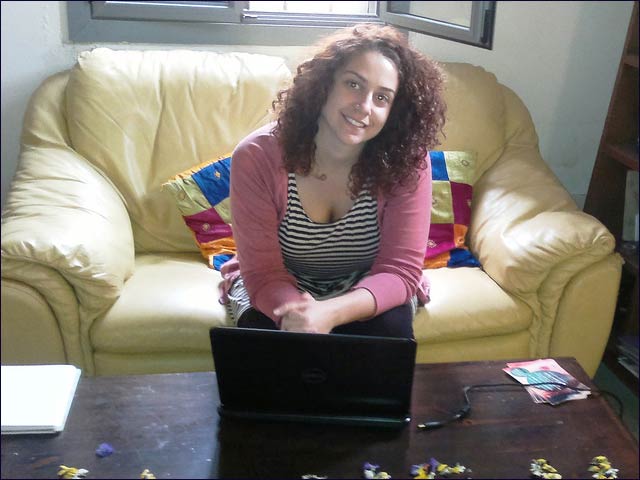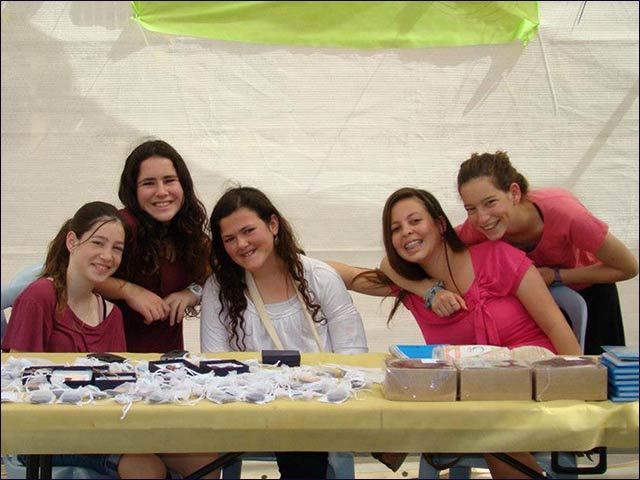By Avigayil Kadesh
While most of his former army buddies were using their discharge grants to explore South America and Asia, Matan Dahan was challenged by an older relative to channel his cash toward building a better Israel.
Along with his sister Naama and his friend Dany Gliksberg, in 2002 Dahan founded the Ayalim Association -- a student movement to build up the Negev in the south and the Galilee in the north.
During university, participating students form communities in areas needing a socio-economic boost. They get full scholarships and discounted rent in return for volunteering 500 hours per academic year.
Each of the 10 Ayalim villages in the Negev and four in the Galilee is distinct from one another. Some are rural, based in mobile homes, while others are in renovated urban apartment buildings. Each one is built by the students themselves in order to give them a deeper stake in their chosen community.
“We have a secret strategic plan to ‘trick’ young people into thinking we are giving them a scholarship, etc., but actually we are making them fall in love with the Negev and the Galilee,” says Ziv Shalev, Ayalim’s vice president for partnership development.
He’s only half joking.
“Coming into this process in which they work hard physically and socially, they have no other choice but to fall in love. You’re working with your peers, building something significant. You’re working with kids at risk, with families. We believe they will want to replicate this experience when they finish their studies and begin real life.”
The plan seems to be working. “We have an amazing rate of 85 percent of Ayalim graduates choosing to stay in the same area,” says Shalev.
During Passover this year, he joined Ayalim members in the Negev to help construct the 19th village for program alumni. It’s on Kibbutz Sde Boker, not far from the first Ayalim project, Adiel Village in Ashalim.
Some 5,000 students have gone through the program already, and nearly 1,000 were accepted this year from a field of 5,000 applicants.
Breaking down walls in Acre
The newest Ayalim student village is in an entirely Arab neighborhood -- the Old City of Acre (Acco) on the Mediterranean coast. Like many Ayalim projects, this one came about by request of the municipality in an effort to shore up depressed areas.
It is Ayalim’s smallest community, with about two dozen students. The largest, in Kiryat Shmona, has more than 80.

Eyal Maccabi, site manager of the Ayalim Student Village in Acre, outside the group’s renovated buildingSite manager Eyal Maccabi leads the steep climb up the old stone stairs in the once-dilapidated Acre house that the students transformed into living quarters. “We found donors, and after a year of renovating we had six or seven apartments ready, then later 10 more,” he says.
Simone, a 25-year-old immigrant from California, shows visitors around her homey suite. She is studying theater at Western Galilee College nearby.

Simone, a college student originally from California, in her room at the Ayalim Village in AcreThe Acre students have slowly overcome the suspicions of a local population puzzled as to why a group of Jewish students would want to move in.
They opened an afterschool youth center, Ofarim, where 40 kids from age six to 12 come without charge to play games, do their homework and explore values such as leadership under the guidance of Ayalim students.
Ofarim centers are common in Ayalim villages. They provide a consistent and meaningful way to contribute to communities where afterschool care is scarce or non-existent.
“Everyone at first was more or less hostile to the students,” says Maccabi. “But after a couple of years, they gave us a better place for our Ofarim Center -- part of a mosque,” he says. “Parents tell us their kids wait eagerly to come.”
The municipality provides a small budget for cleaning supplies and equipment such as board games and a foosball machine. Several desktop computers are also installed in the center.
As Maccabi walks around, Arabs stop to greet him. Good will is earned by offering assistance and sponsoring communal activities, he explains. And residents see that city services such as transportation, garbage pickup and sewage have improved since the Ayalim group moved in.
“We recently raised donations to buy kites for the [neighborhood] kids and charged one shekel for them,” says Maccabi.
“We are apolitical, but we believe the only hope for coexistence is by communicating together on the very basic, personal level.”
Once a week, Ofarim volunteers get professional guidance from PERACH, a nationwide tutoring and mentoring project for disadvantaged children, started in 1974 by students from the Weizmann Institute of Science.
‘Our fate depends on this effort’
Sitting on the Acre building’s rooftop lounge overlooking the Mediterranean beach, Shalev explains that Ayalim is helping to further a goal articulated by Israel’s first prime minister, David Ben-Gurion, three decades after his passing.
“Ben-Gurion said that the Jewish people would need to create a united effort of volunteers to bloom the desert, and this would determine our fate and our place in the human race. It may sound like an exaggeration, but if we aren’t in the Negev and Galilee we’ll lose them, and our tiny country can’t afford that.”
These two geographic areas comprise 80% of Israel’s land mass but account for only 8% of its economy.
“All of Israel does depend on what happens in our biggest land reserves,” stresses Shalev. “Ayalim provides a platform for young people to come and realize the Zionist dream in its physical and spiritual aspects.”
Learning to live in relatively remote places heightens one’s spiritual sensitivity, he says.
“Every time you put people in a difficult situation, they have the potential to become better. It starts with building the village. Twice a year we gather all Ayalim students and [pre-army volunteers] and employees to build or renovate a new village. You work and sweat together, and you also build a connection to the place, to yourself and to others.
“I believe that is what Ben-Gurion meant that our fate depends on this effort, because it’s not only to inhabit this land but to have a place where people are working for the benefit of others.”
Facts on the ground support the wisdom of this approach.
“We want to persuade any young Israeli family to come to the communities we work in,” says Shalev. “Having a free afterschool center is a big incentive. More and more people are coming to live around Ayalim villages. In Ashalim, there were about 15 families living there when we came, and now there are 150. I think we’ve made a huge contribution.”
Safe and clean
The mayor of Kiryat Shmona, a town on the Lebanese border, asked Ayalim to start a village in a neighborhood riddled with crime and drugs.
“We got about 25 apartments and hundreds of us came to renovate, build gardens, clean the street of garbage. Then we transformed four shelters into an Ofarim Center,” says Shalev.
“At first, only a few kids came. With time, the word spread that kids were having a good time and parents started volunteering too, something we try to encourage everywhere. After a few years we got a letter from the mayor that for the first time there were no more police patrols in that neighborhood, no more drugs. It’s still a poor neighborhood, but now it’s safe and clean.”

Residents of Ayalim's Yerucham Student Village banded
together with local residents to put on a street festivalThe organization is supported by donations from several sources, including Keren Hayesod (United Israel Appeal), the Jewish Federations of North America, the Jewish National Fund, private donors and the Israeli government.
In addition, each village runs some sort of profitable enterprise – often a pub for fellow college students and neighbors. In Acre, the seaside location has tourism potential. A separate building gifted to Ayalim was converted to sleeping quarters for visitors such as a recent pair from England’s Arsenal soccer club, who came to volunteer in the Old City for three months.
Community work is the backbone of all Ayalim villages.
Students from the Adiel Village in Ashalim started a Hebrew language afterschool club for fifth- and sixth-graders in the Bedouin town of Bir Hadaj, with the blessing of the local principal and parents. Hebrew fluency is essential for getting ahead in Israeli society.
"We want to bridge the gap between Bedouin and the rest of Israeli society," said Eran Shlomi, social director at the Ashalim Village, "and the children are the key."
As one Adiel volunteer blogged: “I am building a constructive role model for troubled youth. I am building a positive image of Israel and Jews with the Bedouin Arabs. ... I am building a community which goes beyond myself and my peers in Ayalim, but seeks to bring up the whole of the region with us. We have issued a call to action for the next generation of Jews, realizing that the work of establishing the country did not end in 1948.”